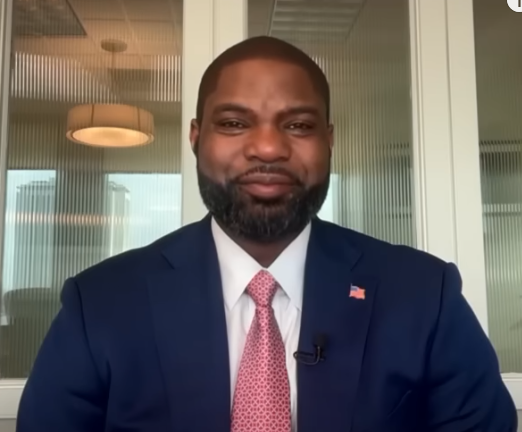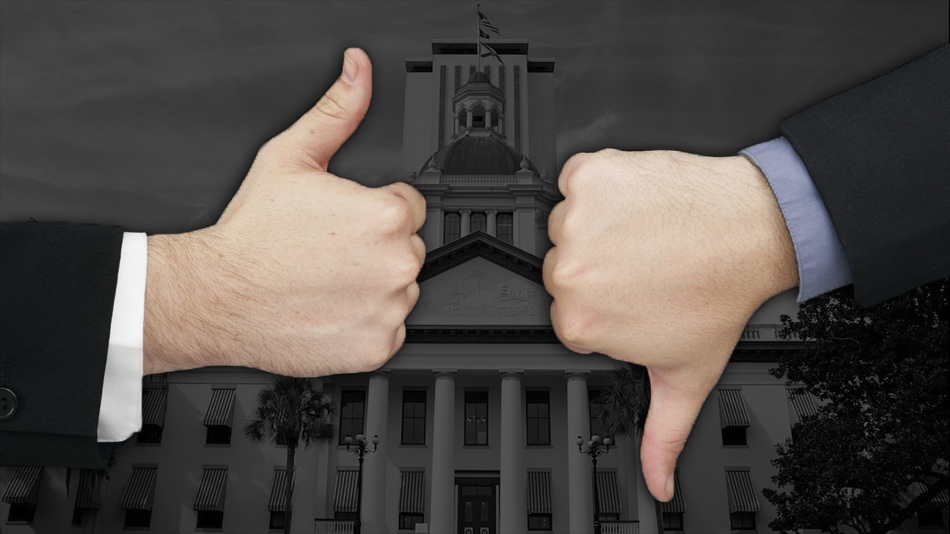The Gators are officially hunting their third men’s basketball national championship.
With a win over Auburn Saturday night, their second victory over the Tigers this season, the University of Florida (UF) is heading to the championship game in San Antonio.
The Gators won 79-73 Saturday night, a much lower scoring game than their 90-81 win over the Tigers in early February.
UF overcame an 8-point halftime deficit and pulled away late in the second half thanks to a stellar performance from Walter Clayton Jr., who finished the game with 34 points. The Gators held Auburn’s top player, Johni Broome, to just 15 points.
The Gators are looking to revive their 2006-07 golden era, when they won back-to-back national championships with a historically great roster featuring Al Horford, Joakim Noah, Corey Brewer and Taurean Green.
Fans complained about how chalky March Madness has been this year. And we love upsets as much as the next guy. But every once in a while, it’s fun seeing the nation’s best teams duke it out with everything on the line. And from the Elite Eight onward, we got the most talent-packed matchups we’ve seen in recent memory.
Now, the Gators will have a chance to etch their names in the history books. It should be a fun one.
Now, it’s onto our weekly game of winners and losers.
Winners
Honorable mention: Tom Leek, Shevrin Jones, Ben Albritton. The Process can be frustrating at times, both for partisans who don’t get their way and for everyday Floridians who at times feel left behind by the back-and-forth in Tallahassee.
But this week, we saw a pitch perfect example of The Process working the right way.
Sen. Leek, an Ormond Beach Republican, was pushing legislation creating harsher penalties for manslaughter cases where a police officer is killed after a controversial case from a few years back. But that pro-law enforcement bill also contained language removing a requirement that police officers act in “good faith.”
Republican backers said the move was necessary to avoid confusion by a jury and further guarantee bad actors are punished if an interaction leads to a cop being killed. But several Black Senators, led by Jones, raised serious concerns about axing that provision and its repercussions, leading to a heated exchange followed by Leek pulling the bill from being voted on.
This week, all was resolved. The “good faith” language was inserted back into the bill, per an amendment posed by Jones, along with definitional language, and the legislation passed unanimously in the Senate. Senate President Albritton and Senate leadership were key to allowing the amendment to go through.
A lot of us who just want to see this state be the best version it can are really tired of the culture war hysteria and fatigued by fights in the Capitol over these issues. This easily could have been another example if Leek and other Republicans demanded to stay firm. After all, Republicans have a supermajority in both chambers. They can do whatever they want.
Instead, Leek listened. The bill got better for it. And what could have served as a legislative food fight instead is an example of lawmakers putting aside their partisan hats and working together to come to consensus.
This is where most Floridians are, no matter how loud the fringes get. And this week shows that if you stop, listen and take up suggested language to make a bill better (even from a Democrat), you can get unanimous support. Thank you to all of these Senators for showing how it’s done.
Almost (but not quite) the biggest winner: Byron Donalds. Donalds does it again.
This week continued to show Donalds building his case to be the front-runner in the 2026 Governor’s race.
First, he announced raising $12 million in his first month as a candidate. That’s a massive haul and a sign that Donalds has tapped into a network to heavily fund his campaign into next August, when the GOP Primary will take place.
Still have concerns he may not have enough resources? Well, Donalds later in the week added U.S. House Speaker Mike Johnson’s endorsement. That’s a direct line into the national GOP donor network.
All of this doesn’t lock anything up 16 months away from any votes being cast.
But it does serve as example after example that more big moves — endorsements, major donations, etc. — are coming Donalds’ way down the line.
Meanwhile, Gov. Ron DeSantis says that if First Lady Casey DeSantis announces her own bid for Governor, she will wait until after this year’s Legislative Session — another month-plus away — to do so.
Great idea. Waiting until after Session to announce a campaign while a rival candidate freely builds up massive momentum has never hurt the DeSantises before.
The biggest winner: Randy Fine, Jimmy Patronis. Scoreboard.
They were outspent big time. Democrats honed in on these seats to show their anger at the Donald Trump administration. Critics — even Florida’s Republican Governor, in Fine’s case — hammered them over residency questions.
And none of it mattered. Both won by 14 percentage points.
Now of course, margins matter. These districts were both Trump +30 districts in November. The fact that Democrats cut the margins by at least half shows something — maybe just the weirdness of Special Elections, or maybe a sign, combined with the Wisconsin results, that Democrats have some successes ahead in more competitive districts.
So down the line, maybe Democrats in other states can build on these results.
But for now? They got nothing. No cutting into the GOP’s thin House advantage. No shocking the world and dunking on Trump.
Fine and Patronis will now likely be able to serve in Congress for as long as they like.
We hate to say we told you so.
Losers
Dishonorable mention: Donna Deegan. Deegan faced an admittedly tough decision this week regarding a Jacksonville law looking to crack down on illegal immigrants by requiring jail time: sign a law she vocally disapproves of, or veto it and invite the wrath of the DeSantis administration, which warned her and others not to interfere with the state’s push on this issue.
And with that choice ahead of her, Deegan made the tough decision … to do neither.
She instead just let the measure become law without her signature.
Talk about a cop out.
Deegan couldn’t sign the bill and invite the wrath of her supporters. But make no mistake: just letting this thing become law without a signature is the same exact thing. Yes, she could put on a performative display by refusing to sign it, but it changed absolutely nothing here.
If she was so opposed, and if she thought she was on firm legal ground in her opposition, she could have vetoed it. Yes, there would have been a backlash, but if that’s her position, then isn’t it incumbent on her to use every means necessary to resist?
And if she knew she was boxed into a corner legally and was essentially forced to accept this at law, then just sign it and explain to her supporters that her hands were tied.
Instead, Deegan tried to thread a needle and ended up taking the squishiest path possible. That’s not leadership.
Almost (but not quite) the biggest loser: Tampa Bay. It appears the Tampa Bay area is getting the short end of the stick in some significant ways when it comes to federal and state budgeting priorities.
Congress appears to be the big villain here. After Representatives from the area pushed for millions to fund water projects to help recover from devastating storms last year, Republicans in the House voted to cancel every single project. That includes pushes from Republican U.S. Rep. Anna Paulina Luna, as well as Democratic U.S. Rep. Kathy Castor.
“Some of these were pretty modest congressional appropriations, but they fill huge needs back home,” Castor said.
There’s more. An op-ed in the Tampa Bay Times from Rick Garrity, who used to lead Hillsborough’s Environmental Protection Commission, argued that cuts to the Environmental Protection Agency are going to harm the region’s water quality.
And food banks are warning that a funding slash targeting the U.S. Department of Agriculture will hammer food purchasing programs in Tampa Bay and the ability to distribute food to those in need.
On that latter point, the Florida Senate budget appears to make up some of the difference in the loss of federal funds. But so far, the Florida House isn’t going along.
Things like the Department of Government Efficiency cuts and Trump’s tariff program may lead to some long-term gain. Some believe they are absolutely necessary, even with the short-term pain they bring.
But these potential benefits only come if our leaders execute these plans, well, efficiently. And so far, the massive screw-ups we’ve seen in these areas the first few months of Trump’s administration are making a lot of people worry.
And in the meantime, these various silos in Tampa Bay are getting left behind.
The biggest loser: Jackson McMillan. This guy …
“Unethical.” “Hard to justify.” “Donor abuse.” Those were just a few of the phrases from Democratic consultants used to describe the fundraising strategy for the two Democratic congressional candidates who got blown out by Fine and Patronis Tuesday.
That money was essentially lit on fire here isn’t solely the fault of McMillan and his firm, Key Lime Strategies. Democrats nationwide were eager to see a sign of hope, and these were the first two congressional Special Elections in the country since Trump took office. Many donors probably didn’t realize how ruby red they were; they just wanted a place to vent. So money poured in.
But as Gay Valimont and Josh Weil raised around $16 million as of March 12, McMillan pocketed around $4.7 million during that time span.
Not bad for two elections where your candidates lost by nearly 30 points combined.
McMillan told Florida Politics that everything he charged, he displayed upfront.
Fair enough. But let’s pull back for one second.
As hype as these fundraising numbers were for Democrats, the chances they were ever winning these seats was always near zero, despite some of the breathless media coverage from outlets looking to gin up drama.
So without a win, what could Democrats realistically get from hauling in all of this money? They could have used it to build up infrastructure. They could have transferred some of it to a larger party apparatus that could use it for more competitive races.
You know what doesn’t help the Democratic Party? A consultant pocketing about a third of this massive haul for, again, delivering two 14-point losses.
So far, no one’s alleging anything illegal here. McMillan in his defense argued, in part, that this is just how the game is played. And to some degree, he is correct.
But as he pointed to other consultants hauling in big paychecks, we’d like to point out one thing: Many of those firms have actually won a lot of big races. That’s why Democrats hire them.
McMillan did nothing here and siphoned money that could have been spent better elsewhere. That’s great for him, and everyone should get a bag where they can.
But for Democrats actually looking to compete in this increasingly red state, we’re just not sure what McMillan is offering going forward.
Post Views: 0

 Entertainment8 years ago
Entertainment8 years ago
 Politics8 years ago
Politics8 years ago
 Entertainment8 years ago
Entertainment8 years ago
 Entertainment8 years ago
Entertainment8 years ago
 Tech8 years ago
Tech8 years ago
 Tech8 years ago
Tech8 years ago
 Tech8 years ago
Tech8 years ago
 Politics8 years ago
Politics8 years ago









